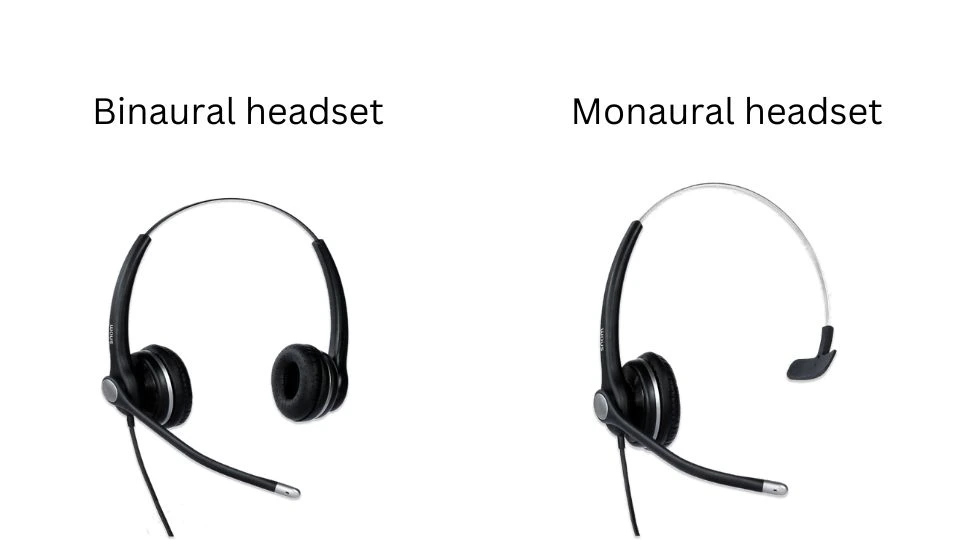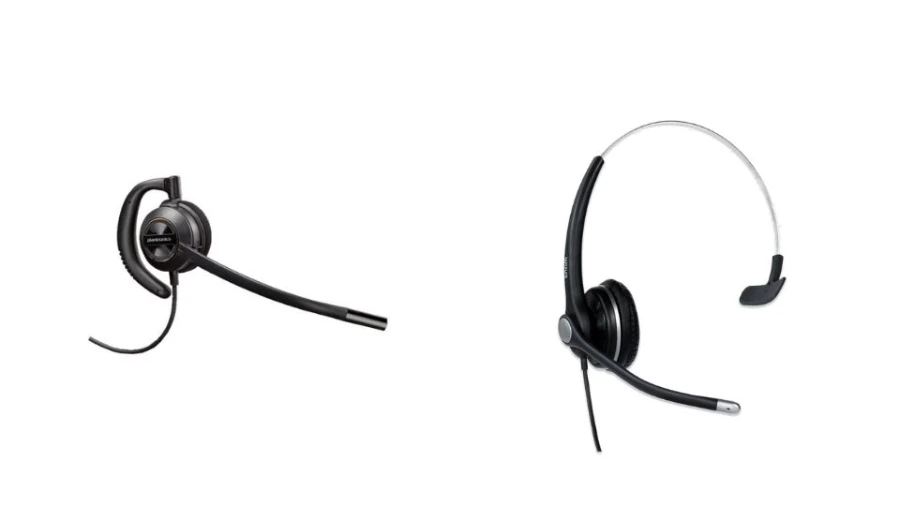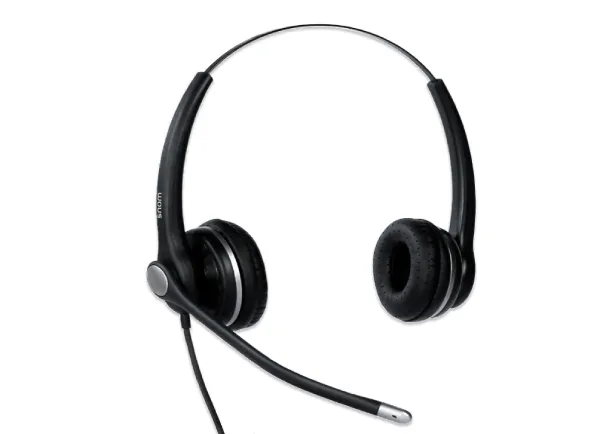When choosing a headset, you might encounter two types: monaural and binaural. The primary difference is that a monaural headset has one earpiece, while a binaural headset uses two. This distinction is the most significant, but there are other, more nuanced differences. For instance, the way they fit around the ear, differences in weight and price, comfort, and various other factors distinguish these two types of headsets.
It’s pretty clear that if we compare these two types of headsets, we’re looking at it from a work perspective. I mean, seriously, who’s considering a monaural headset for home use or gaming? That’s likely a no-go. So, all the points I’ll bring up will be about office work, maybe even with a call center view in mind. That’s where this kind of debate usually comes up and really matters.
The difference between monaural and binaural headsets
Monaural headsets have a single earpiece, whereas binaural headsets come with two earpieces. As a result, monaural headsets tend to be lighter than their binaural counterparts. From a communication perspective, monaural headsets allow for easier interaction with people in your immediate environment, keeping one ear open.

On the other hand, binaural headsets, by covering both ears, offer enhanced sound isolation, which can reduce the ability to hear external noises and distractions, potentially making it more challenging to converse with a colleague without removing the headset. I have made the table below to make it easier to understand the difference.
| Feature | Monaural Headsets | Binaural Headsets |
|---|---|---|
| Number of Earpieces | One earpiece | Two earpieces |
| Weight | You may need to remove it to communicate effectively with those around you | You may need to remove it to communicate effectively with those around you |
| Communication | Easier to communicate with people around you without taking off | It is ideal for noisy environments or when focus is needed |
| Noise Cancellation | Less effective, as one ear is open to ambient sound | It is more effective covers both ears for better isolation |
| Use Case | Suitable where awareness of surroundings is important | Ideal for noisy environments or when focus is needed |
| Sound Experience | Mono sound, less immersive | Stereo sound, more immersive |
What is a monaural headset?
The monaural headset has only one speaker, making it for one-ear use. Obviously, it doesn’t provide enough sound cancellation (at least because one of your ears isn’t hidden in the speaker). At first glance, it may seem like a bad type of headset, but it isn’t.
Monaural headsets come in two main styles: one with an earpiece that clips directly onto the ear and another with an over-the-head band. When it comes to comfort, opinions are wildly divided. Some argue that ear clip models are superior because you can barely feel them, essentially forgetting you’re even wearing a headset. Others find them quite uncomfortable, claiming they exert too much pressure on the ear. Before making a purchase, I strongly recommend trying on a monaural headset to see how it feels for yourself. Based on my experience, I fall into the camp that isn’t fond of the ear clip design. I’ve tried it a few times out of curiosity, and it was notably uncomfortable for me.

Another advantage of monaural headsets is that they are usually quite lightweight, so your head won’t get tired if you’re wearing them for a long time (or at least it would be much less tired than with a binaural headset). So, a monaural headset is a better choice if you want to hear the surrounding sound.
What is a binaural headset?
On the flip side, binaural headsets have two speakers designed for both ears. This setup is a much better choice if you want to focus on what’s happening through your headset rather than around you. For instance, if your job involves dealing with important clients or if you find it hard to concentrate because of background noise. Additionally, these headsets are more suitable for taking a quick break to relax and watch a video on your computer; watching something with just one earpiece just doesn’t deliver the same pleasant experience.

Vladimir Sereda, in his article for Splaitor, writes that he talked to three people who are involved in works with a lot of communication, and all of them told him that binaural headsets are better. That makes sense, as it allows you to concentrate on the conversation without being distracted by surrounding sounds.
What’s better: a monaural headset or a binaural headset?
The answer might sound a bit cliché, but truly, it all boils down to personal preference and what you’re looking for in a headset, as I’ve mentioned before. If you’re asking for my take, especially considering we’re probably talking about headsets for work (because, honestly, who’s doing this comparison for non-work reasons?), I’d lean towards the binaural headset.
From what I’ve heard from friends who’ve spent time in call centers, a binaural headset is a game changer. The noise cancellation lets you zero in on the call and tune out everything else, especially in a bustling office. And hey, if you need to chat with a coworker, flipping off one side of the headset isn’t a big deal at all. So, yeah, for a work setting? Binaural all the way.





